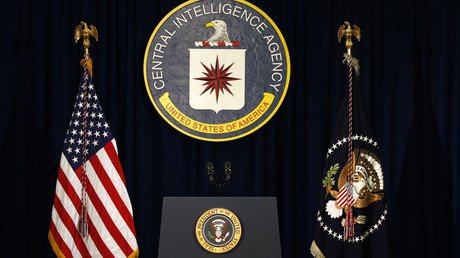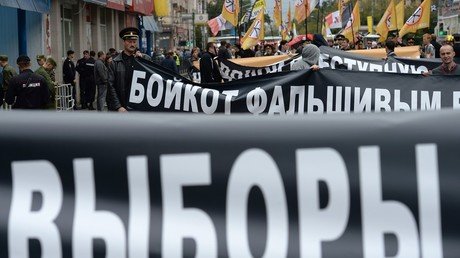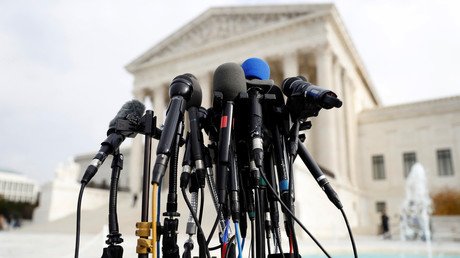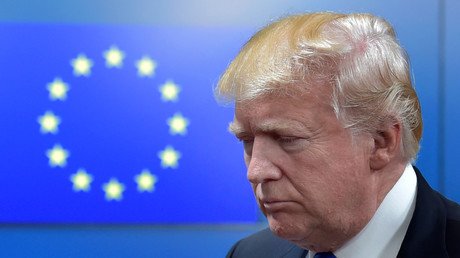Funding NGOs & stirring dissent: Russian special commission exposes election meddling by US
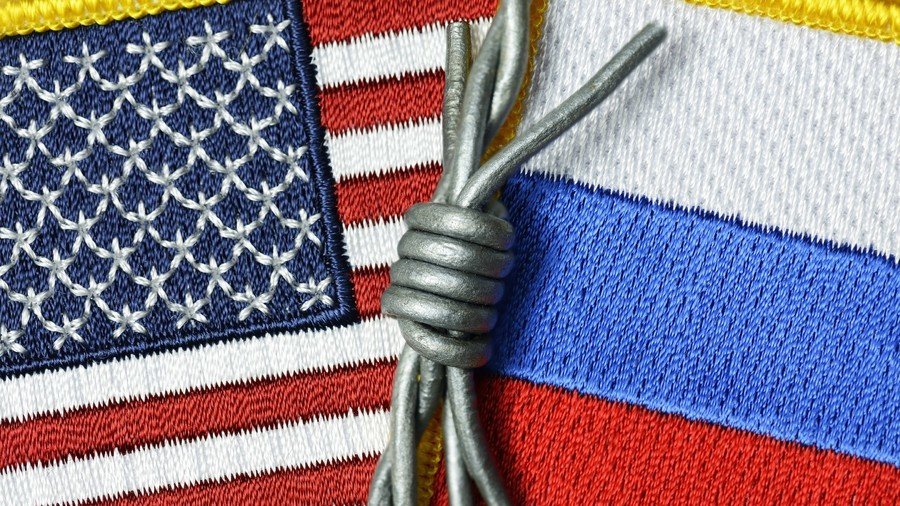
A special commission report on foreign meddling in the 2018 presidential election has been unveiled in Russia’s Upper House. The document highlighted the main methods of the elaborate campaign, spearheaded by the US.
The report, presented on Wednesday in Russia’s Upper House (the Senate), was prepared by the Commission for State Sovereignty Protection in cooperation with leading experts and analysts. The publicly available document was presented by the head of the commission, Senator Andrey Klimov.
The document pinned the blame for the meddling in Russia’s election directly on Washington, linking the ongoing surge in hostile activities with the domestic political struggle in the US. Attempts to interfere in internal Russian affairs, however, are not new, as they have been going on since the collapse of the Soviet Union.
The US has been the “main violator of international law” since the founding of the United Nations, and has “interfered more than 120 times in the affairs of 60 countries on all continents.” Washington’s closest allies – the UK, Germany, France, NATO, and European countries – are also to blame, since they either participate directly or support US activities, according to the document.
“We tried to show… the areas in which the subversive work took place. We’ve named 10 such areas. We have concrete examples for all of them based on absolutely reliable facts. It’s not someone’s guess, it’s not ‘highly likely,’ it’s something we can prove anywhere, it is backed up by testimonies, documents and it is, by great margin, not disputed by the other side [the US],” Klimov said at a press conference, which followed the hearings in the Upper House.
The main purpose of the commission’s report, according to Klimov, is to show the public – both Russian, and international – the scale and systematic nature of the efforts to undermine Russia’s “electoral sovereignty.” The ultimate goal of these activities is to force changes of Russia’s political course, destroy its territorial and economic integrity, he said.
Direct election meddling & stirring dissent
The West has been trying to de-legitimize each and every election in Russia, routinely dismissing them as “undemocratic.” Ahead of the 2018 presidential election, both the US and EU condemned the barring of opposition figure Aleksey Navalny from the election. Ignoring his criminal conviction that bars Navalny from running for president, a US State Department representative called it a move to “suppress independent voices.”
The EU foreign office went even further and stated that barring the politician from the election due to “an alleged past conviction” casted “serious doubt on political pluralism in Russia and the prospect of democratic elections.” Such calls for “democracy” completely disregard Russian law and constitute a blatant attempt at election interference. While one may view Navalny’s conviction as they please, it is certainly not an “alleged” but a very real one, Klimov noted.
Russian senators list 100 examples of US meddling in foreign nations’ affairs https://t.co/DDRLcIqFjcpic.twitter.com/BeaqwlgC5h
— RT (@RT_com) February 19, 2018
The election meddling also included wide-scale cyberattacks on government electronic resources, primarily the Central Election Commission. All in all, roughly one-third of such attacks are conducted from US territory, according to the report.
More discreet methods include stirring dissent by intensifying the activities of foreign-based Russian-language media outlets and “independent” bloggers. The use of modern technology and communication methods apparently yielded some results, since the latest protests, while much smaller than those of 2011-13, increasingly attracted younger and even underage activists into the streets.
Generous NGO funding
NGOs operating in Russia have enjoyed a steady flow of funding from abroad, which spiked following the failure to discredit the 2012 presidential election. In 2015, for instance, politically active NGOs received 80 billion rubles (around $1.3 billion) from the US alone, the report says.
Although Russia limited the activities of foreign NGOs within the country, requiring them to openly register as ‘foreign agents,’ the flow of funds did not stop. Various ‘grey’ schemes came into use, such as providing large sums in cash or transferring funds to private individuals. In the meantime, Russia-based subsidiaries of foreign NGOs flourished – their funding in 2017 almost doubled compared to 2016.
The total amount of NGO funding greatly surpasses the upper limit for a presidential candidate’s campaign in Russia. The scale is comparable to the entire budget for holding elections in the entire country, according to the report.
Apart from directly financing “civil activists” in Russia, the US and its allies spent money on more covert activities. Ahead of the election, several unsanctioned socio-political surveys were conducted in Russia, which were sponsored by foreign government structures – including the Pentagon – the report stated.
Targeting top Russian leadership, and Putin personally
A large part of the foreign efforts to interfere in domestic affairs targeted Russian President Vladimir Putin directly. This was observed as early as 2004, but spiked ahead of the 2012 election, according to the report. Then-US Vice President Joe Biden visited Russia and met with opposition figures, and told Putin that he should not run for a new term, since “Russia was tired” of him, the report says.
A similar pattern was seen in the following years, with Putin being portrayed as the only obstacle to the growth and prosperity of the Russian economy, and the man who “deprives the people of the democratic achievements of the 1980-90s.” Apart from smear campaigns, the report said some media also tried to demonize the Russian president in the eyes of the public by exaggerating certain problems to provoke Putin into making “unacceptable mistakes.”
Proposed countermeasures
The foreign activities outlined, however, failed to yield any tangible effect on the election, proving not their ineffectiveness, but the strength and stability of Russia’s socio-political system, the report concludes.
The commission prepared a set of recommendations on countermeasures against future foreign meddling, primarily by tightening up the laws. The proposed measures include prohibiting foreign-printed election campaign handouts, banning the participation of non-Russian citizens in the campaigns in any form, and barring dual-citizenship individuals from becoming trustees of candidates.
Other recommended measures include introducing a “special relationship” format with countries that impose sanctions or meddle in Russian affairs.
The recommended measures are not limited to restrictions. The report called for other countries and international organizations to become united in jointly opposing US meddling practices. On the home front, special attention will be given to education work, aimed primarily at young people, who are deliberately targeted with foreign propaganda, Senator Lyudmila Bokova told the press conference. The classified version of the report, according to Klimov, contains additional recommendations for countering foreign meddling.
Think your friends would be interested? Share this story!
